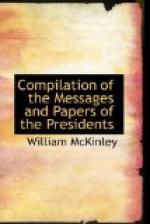For the relief of our own citizens suffering because of the conflict the aid of Congress was sought in a special message,[1] and under the appropriation of May 24, 1897,[2] effective aid has been given to American citizens in Cuba, many of them at their own request having been returned to the United States.
The instructions given to our new minister to Spain before his departure for his post directed him to impress upon that Government the sincere wish of the United States to lend its aid toward the ending of the war in Cuba by reaching a peaceful and lasting result, just and honorable alike to Spain and to the Cuban people. These instructions recited the character and duration of the contest, the widespread losses it entails, the burdens and restraints it imposes upon us, with constant disturbance of national interests, and the injury resulting from an indefinite continuance of this state of things. It was stated that at this juncture our Government was constrained to seriously inquire if the time was not ripe when Spain of her own volition, moved by her own interests and every sentiment of humanity, should put a stop to this destructive war and make proposals of settlement honorable to herself and just to her Cuban colony. It was urged that as a neighboring nation, with large interests in Cuba, we could be required to wait only a reasonable time for the mother country to establish its authority and restore peace and order within the borders of the island; that we could not contemplate an indefinite period for the accomplishment of this result.
No solution was proposed to which the slightest idea of humiliation to Spain could attach, and, indeed, precise proposals were withheld to avoid embarrassment to that Government. All that was asked or expected was that some safe way might be speedily provided and permanent peace restored. It so chanced that the consideration of this offer, addressed to the same Spanish administration which had declined the tenders of my predecessor, and which for more than two years had poured men and treasure into Cuba in the fruitless effort to suppress the revolt, fell to others. Between the departure of General Woodford, the new envoy, and his arrival in Spain the statesman who had shaped the policy of his country fell by the hand of an assassin, and although the cabinet of the late premier still held office and received from our envoy the proposals he bore, that cabinet gave place within a few days thereafter to a new administration, under the leadership of Sagasta.
The reply to our note was received on the 23d day of October. It is in the direction of a better understanding. It appreciates the friendly purposes of this Government. It admits that our country is deeply affected by the war in Cuba and that its desires for peace are just. It declares that the present Spanish government is bound by every consideration to a change of policy that should satisfy the United States and pacify Cuba within a reasonable time.




